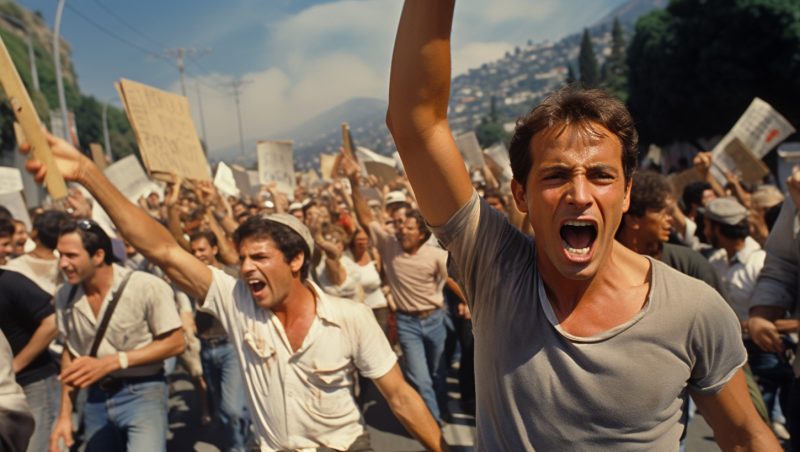
In an unprecedented turn of events, Hollywood has been ground to a halt. The silver screen has lost its lustre as thousands of actors have banded together with their writer counterparts, instigating the largest Hollywood strike in over sixty years.
No acting, no promotion, no Hollywood magic – the world of cinema is coming to a screeching halt. Mega-budget sequels such as those in the Avatar and Gladiator franchise are suddenly on the brink of becoming merely well-curated conceptual pieces. But who’s to blame for this cinematic impasse?
Actors and writers embarked on this industrial action in May, aggrieved by the trifecta of shrinking paychecks, deteriorating working conditions, and the omnipresent specter of artificial intelligence’s invasion of the industry.
The veteran Scottish actor, Brian Cox, candidly gave an inkling of the strike’s potential longevity to the BBC. He reckoned it might stretch until we ring in the New Year. He lamented the seismic shift in the industry landscape caused by the streaming giants. “They are trying to freeze us out and beat us into the ground, because there’s a lot of money to be made in streaming and the desire is not to share it with the writers or the performers,” he said.
A contract negotiation with studios and streaming behemoths had recently broken down, according to the Screen Actors Guild (SAG). They accused the Alliance of Motion Picture and Television Producers (AMPTP) of being stubbornly parsimonious. A substantial legion of 160,000 performers joined their cause, amplifying the original dissenting voices of the 11,500 members of the Writers Guild of America (WGA) that had previously downed their pens in May.
Picket lines have started to snake around the monolithic offices of studios and streaming services in Los Angeles, New York, and beyond. Their actions have drawn sympathy from some of the most illustrious names in the industry, adding heft to their cause. The ensemble of the upcoming film, Oppenheimer, provided a notable example when they opted to forgo their red carpet glamour moment.
The unionized actors and writers are clear in their demands: better remuneration, higher royalties, improved contributions to their pension and health funds, and assurances concerning AI’s creeping influence on their craft.
And the ripples of this strike are already palpable. Productions that are poised on the brink of a stall include sequels to the Avatar, Deadpool, and Gladiator franchises, as well as the newest seasons of popular shows like Stranger Things, Family Guy, and The Simpsons. Not to mention, the lavish rituals of red-carpet premieres, promotional events, and awards ceremonies like the Emmys and Comic-Con, are being abruptly abandoned or diminished.
This strike is not just about immediate gratification. It’s a reaction to the inexorable march of technology and the fundamental changes to the way content is consumed in the digital era. Academy Award-winner Susan Sarandon, a familiar face on the New York picket line, stressed the urgency of tackling the AI issue now rather than later.
Complaints about shrinking income and inflation eroding contracts echo from both actors and writers. With roles paying less and less, actors find themselves chasing more parts to keep up their income. Contracts for writers are becoming more fleeting and risk-laden, often leaving them unpaid for revisions or additional work.
SAG president Fran Drescher chimed in on the matter, pointing an accusatory finger at an unnamed “greedy entity”. “I am shocked by the way the people that we have been in business with are treating us,” she said.
This concurrent action marks the first such standoff in the industry since 1960. The last actor’s strike, in 1980, lasted a long ten weeks. The Directors Guild of America (DGA) is not officially part of this protest, having successfully negotiated its own contract in June. However, they expressed their unequivocal support for their striking peers.
With the risk of a long-drawn-out strike looming large, movie theaters may face dire straits and audiences may be stuck with only reality TV and live sports to fill their viewing void.
President Joe Biden offered his two cents on the matter. Through a spokeswoman, Robyn Patterson, he expressed his belief in fair pay and benefits for all workers, including actors, and supported their right to strike.
Meanwhile, across the pond, Equity, the UK’s equivalent of SAG, has no such action planned, owing to UK employment laws. However, the union stated that it would vigilantly monitor any attempts to relocate US productions to the UK.
In sum, as this modern-day David and Goliath tale unfolds, the world waits to see how Hollywood will react, and whether the glitz and glamour of the silver screen will be forever tarnished by this seismic upheaval.
